Key takeaways:
- The death penalty raises complex moral questions about justice, revenge, and the potential for wrongful convictions.
- Debates on the topic highlight the powerful influence of personal stories, which can shift perspectives and deepen understanding of the issue.
- Participating in discussions fosters critical thinking, effective communication, and active listening skills, enhancing the ability to engage with opposing viewpoints.
- Emotional experiences shared in debates underscore the significance of human narratives over mere statistics, emphasizing the real-life implications of capital punishment.
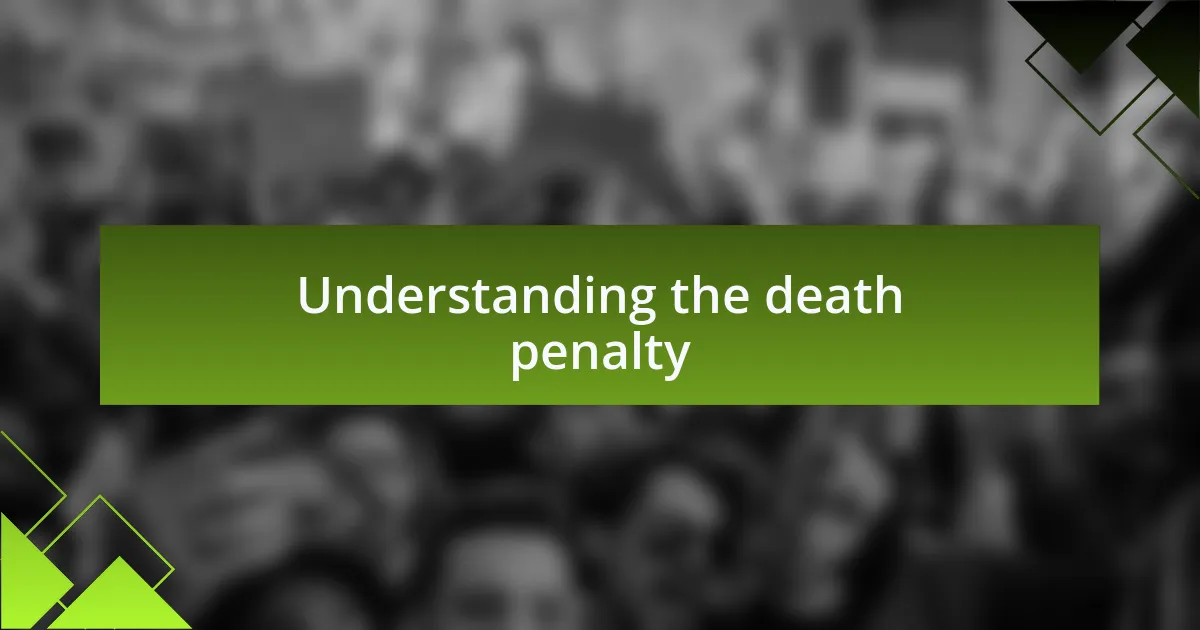
Understanding the death penalty
The death penalty is one of the most controversial topics in modern justice systems. I remember the first time I engaged in a debate about it; the tension in the room was palpable as opinions clashed. How can we justify taking a life when every person has their own story, their own struggles?
To truly understand the depth of the death penalty, we need to consider its origins and the varied arguments surrounding it. For instance, some argue that it serves as a deterrent against crime, while others believe it reflects a failure in our legal system. Personally, I often found myself wrestling with the thought: is it really justice or simply revenge cloaked in legal terms?
Emotions run high when discussing the irreversible nature of capital punishment. I once spoke with a victim’s family member who, despite their pain and loss, questioned whether execution would truly provide closure. That conversation stayed with me, raising important questions about morality and the effectiveness of our justice system. How do we balance the needs of society, the rights of the accused, and the impact on victims’ families?

Arguments against the death penalty
When discussing arguments against the death penalty, one key point that often emerges is the risk of wrongful convictions. I remember attending a debate where a participant shared a heartbreaking story about a man who spent years on death row for a crime he didn’t commit. It made me wonder: how can we, as a society, endorse a system that could potentially end an innocent life?
Another significant concern is the lack of consistent application in death penalty cases. There seems to be a troubling correlation between socioeconomic status and who ends up on death row. I can’t help but ask, why does the color of someone’s skin or their financial resources influence their chances of facing the ultimate punishment? This inconsistency raises disturbing questions about fairness in a system that is supposed to deliver justice.
Moreover, the death penalty often doesn’t serve its intended purpose as a deterrent to crime. In my own reflections, I’ve come to see that countries with the death penalty don’t necessarily have lower crime rates than those that have abolished it. So, I find myself pondering: if the goal is to create safer communities, might we be better off investing in prevention and rehabilitation instead of perpetuating a cycle of violence?
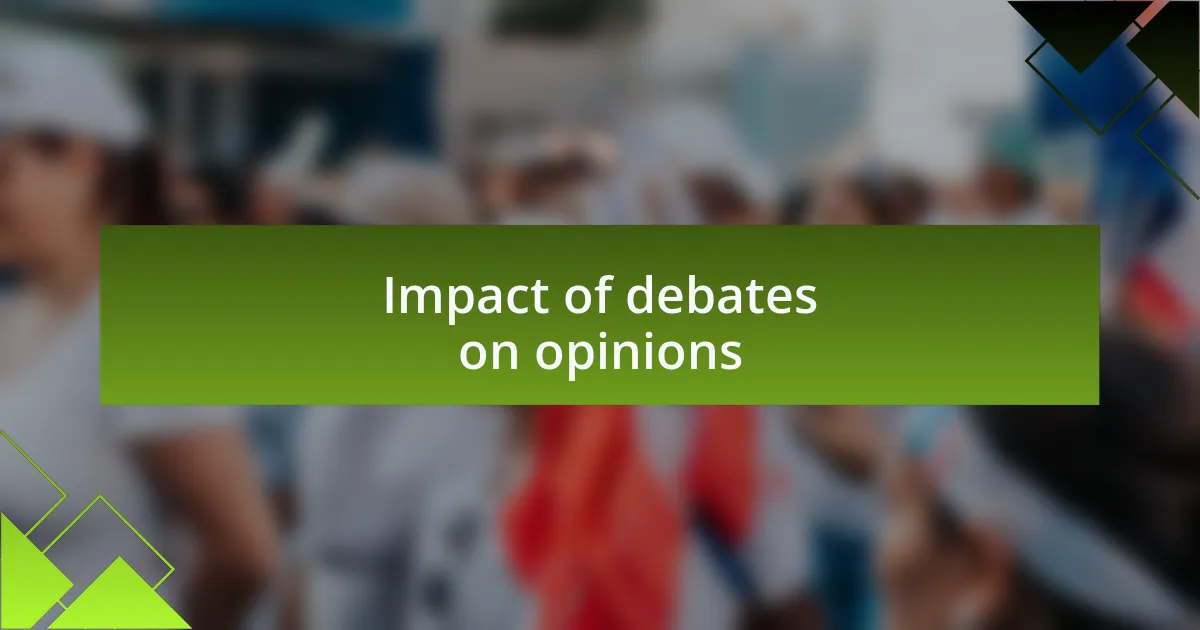
Impact of debates on opinions
Participating in debates around the death penalty has profoundly shifted my perspective. Each discussion revealed that opinions are often shaped by personal stories and emotional connections rather than mere statistics. I remember a heated exchange when a debater shared a heartfelt account of a family affected by a wrongful execution. Hearing that narrative really struck a chord with me, prompting me to reflect on the human element behind such a serious issue.
Moreover, engaging in these debates illuminated the power of empathy in shaping viewpoints. I found that listening to others’ experiences often challenged my preconceptions. For instance, in one debate, a survivor of violent crime passionately argued for the death penalty, yet her story also conveyed a deep desire for healing and change, not revenge. It made me ask: is it justice we seek, or a path toward reconciliation?
My involvement in these debates has also shown me that opinions can evolve, sometimes unexpectedly. After presenting my thoughts against capital punishment, a fellow participant raised questions that made me rethink my stance. They emphasized the importance of restorative justice as a solution. I didn’t just defend my views; I absorbed theirs, feeling my own opinions shift. This exchange made me realize that engaging in respectful debate fosters growth and understanding, which is vital in navigating such complex issues.
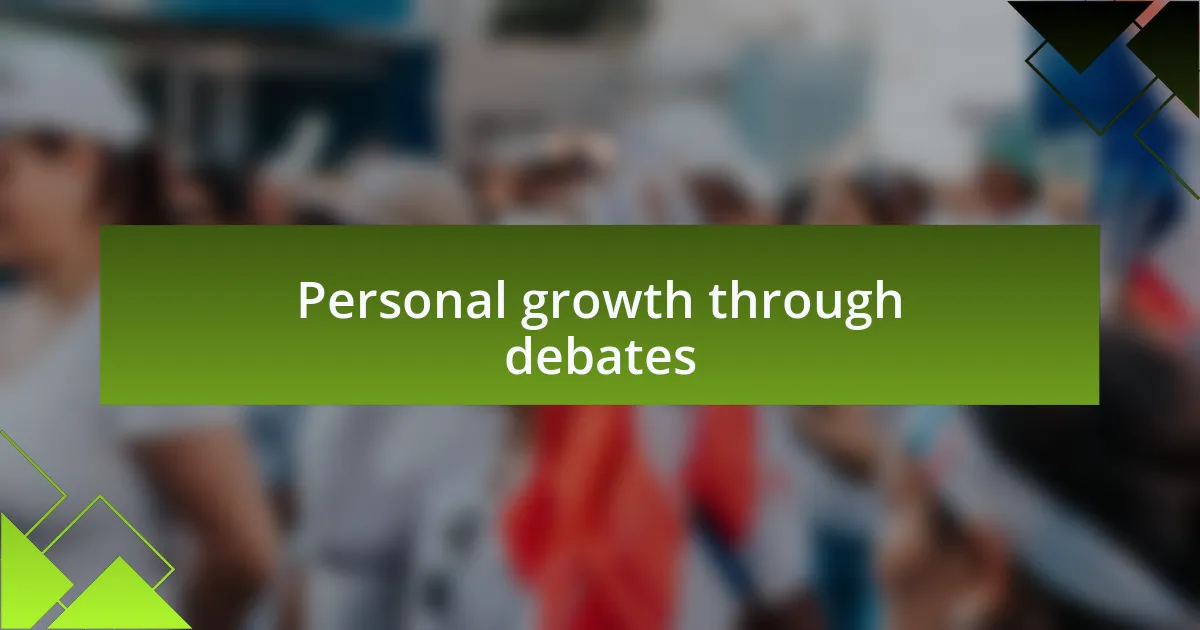
Personal growth through debates
Engaging in debates has been a transformative journey for me. I recall one particular debate where a participant shared their experience as a wrongful conviction advocate. It was eye-opening to hear the anguish and strength in their voice, and it made me realize how personal experiences profoundly shape our understanding of justice. After that moment, I began to question how often we overlook the human stories behind our beliefs. Isn’t it essential to listen more deeply?
Another time, I encountered a speaker who had lost a loved one to violent crime. Their passionate defense of the death penalty was filled with anguish and a desire for closure. Yet, as I listened, I couldn’t help but empathize with their pain while also feeling a tug towards compassion for all involved. That internal conflict drove me to think: how do we balance grief and justice? Debates like these have taught me the importance of finding compassion within contrasting viewpoints, helping me grow not just as a debater, but as a person.
Through these discussions, I’ve found that vulnerability is a powerful catalyst for personal growth. I remember sharing my own hesitations about the death penalty, exposing my uncertainty in a room full of confident advocates. At first, it felt daunting, but the respect and openness that followed were incredibly empowering. It encouraged others to open up too, creating a rich environment for growth. Isn’t it remarkable how sharing our doubts can lead to a deeper understanding of complex issues?
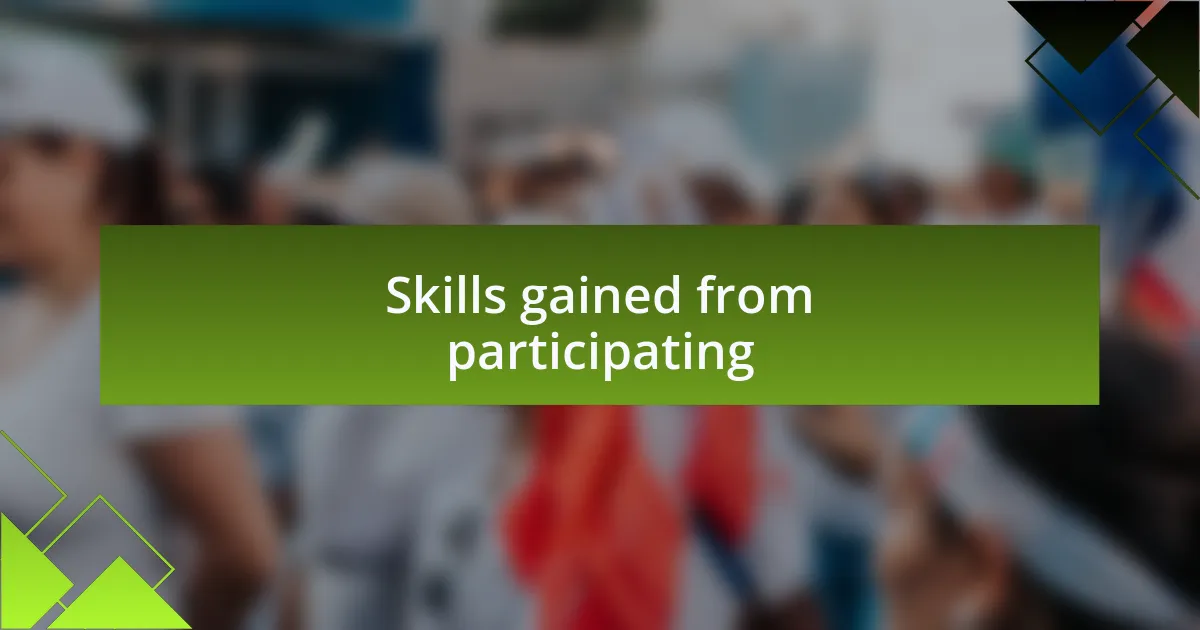
Skills gained from participating
Participating in debates has sharpened my critical thinking skills immensely. I remember a particular debate where I had to counter a well-researched argument about the deterrent effect of the death penalty. It forced me to dig deeper into statistics and case studies, enhancing my ability to analyze information and construct well-founded arguments. Isn’t it fascinating how a single question can lead you down a rabbit hole of research and insights?
Another skill I’ve honed is the art of effective communication. I vividly recall a moment during a heated exchange when I used a personal story to illustrate my point. The shift in the room was palpable; suddenly, my viewpoint was more relatable. That experience taught me how storytelling could bridge gaps between opposing opinions, transforming tension into a more respectful dialogue. Have you ever noticed how much more engaged people become when they can connect on a personal level?
Lastly, I’ve learned the importance of active listening. Early on, I often found myself preparing my next point while others spoke. However, a debate mentor advised me to listen more intently, which changed everything. I recall a debate where I picked up on a small detail from an opponent’s argument, which allowed me to craft a decisive rebuttal. This realization about the power of listening made me appreciate our shared humanity, deepening my commitment to mutual understanding. Isn’t it incredible how listening can turn debates into conversations?
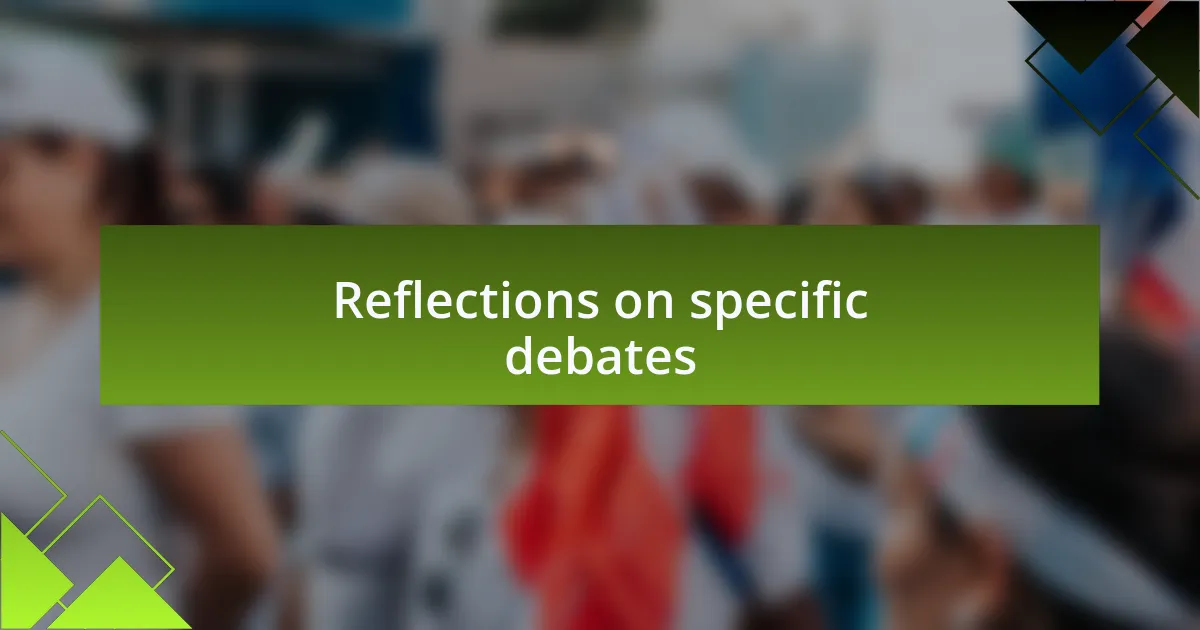
Reflections on specific debates
Reflecting on specific debates, I can’t help but remember one intense encounter where the focus was on the moral implications of capital punishment. As my opponent made their case, I felt a wave of emotion wash over me, realizing how deeply personal these issues are for many families affected by violent crimes. That debate turned into a powerful reminder that statistics are not just numbers; they represent lives, stories, and suffering. Have you ever found yourself caught between numbers and narratives, struggling to find where one ends and the other begins?
In another debate, we tackled the effectiveness of rehabilitation versus punitive measures. I raised my voice a bit too passionately when discussing a specific case of a reformed inmate who became an advocate for change. Looking back, I see how my deep connection to that story allowed me to resonate with audience members. Their nods and smiles indicated that, through sharing this powerful narrative, I had struck a chord. Doesn’t it amaze you how personal stories can draw in listeners who might otherwise be indifferent?
Finally, one debate stands out for its sheer emotional weight as we discussed wrongful convictions and the irreversible nature of the death penalty. I vividly recall sharing the haunting tale of an innocent man who spent years on death row before being exonerated. The room fell silent, and I felt a collective shudder that we were all part of. In that moment, I realized that while we may argue facts and figures, it’s the human experience that truly captivates and compels action. How can we ignore the profound impact these stories have on the way we perceive justice and humanity?